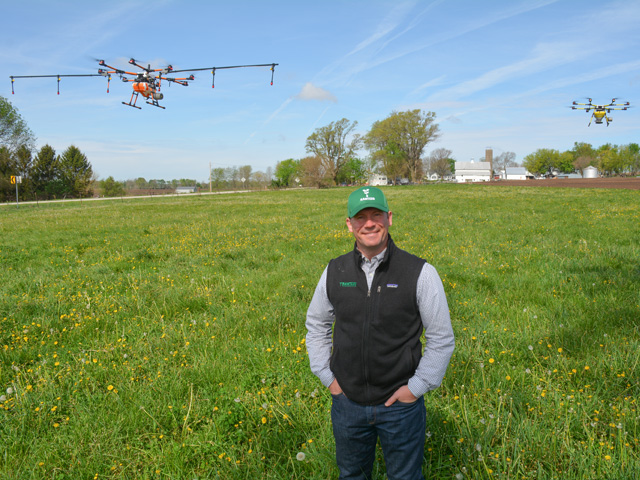Drones Swarm Farm Fields
Three Drones Work Together to Spray and Seed Fields
IOWA CITY, Iowa (DTN) -- A heavy downpour would be a disaster for most field days. But the muddy mess was the perfect opportunity for Michael Ott, the CEO of Rantizo, to show off how a new system of unmanned aerial vehicles (UAVs) work together to spray pesticides and seed crops.
"If you needed to spray today, you couldn't with a ground rig," said Ott, during a media day at the company proving grounds near Iowa City, Iowa. "But our drone systems can do it. People are realizing a drone can treat areas that tractors or self-propelled sprayers are not suitable for."
Rantizo, which means "to sprinkle" in Greek, has spread its wings recently by developing technology and equipment so multiple UAVs can work together to spray or seed fields efficiently. In this case, a fleet of three drones work together and are capable of applying herbicides, fungicides, insecticides, nutrients and cover crop seeds.
(Read a 2019 Progressive Farmer story on the tech start-up company here: www.dtnpf.com/agriculture/web/ag/news/article/2019/11/20/iowa-startup-hopes-provide-options.)
Rantizo started in 2018 modifying DJI Agras drones with a proprietary Spray Upgrade Kit, which includes a configurable 14-foot boom and enhancement to pumps that increase spray productivity and coverage. Drones can also be equipped to broadcast cover crop seed.
One drone can cover up to 14 acres per hour. Now, Rantizo has developed a system that allows a licensed drone pilot and a visual observer to fly up to three drones autonomously and simultaneously. These so-called "swarms" can cover even more acres.
Earlier this year the company added a Load & Go trailer to outfit ag retailers and custom applicators with everything needed for drone applications. It includes a swarm (three) of drones, batteries, custom storage space, generator, water and chemical tanks, autonomous chemical mixing equipment and more. The cost for the trailer and everything in it is about $145,000, which can vary based on options selected.
P[L1] D[0x0] M[300x250] OOP[F] ADUNIT[] T[]
Ott doesn't see drones replacing self-propelled or pull-type sprayers or airplanes as the primary application method of chemicals and fertilizer. He also expects planters and drills to seed the bulk of cover crops. However, Ott sees UAVs as valuable tools because they can:
-- Make spot applications.
-- Treat or seed fields in a timely manner that are too wet to support heavy equipment when soil compaction is a concern.
-- Spray and seed fields with obstacles or in or near urban areas that make traditional applications difficult.
"Rantizo's system compliments ground rigs and crop dusters," Ott said. "Farmers and applicators have invested in that equipment to solve 100% of their problems but it's really only good for 75 to 80% of their needs.
"Maybe you have a portion of a field to spray for weeds. We can do it without spraying the entire thing or have a negative effect on the crop (possibly running over plants)," he continued. "Site-specific spraying (with our drones) can be done more efficiently than anything else on the market."
Ultimately, drones can save time and money when it comes to spot spraying and seeding, Ott claimed. And, potentially, boost productivity and profit potential.
Ag Partners Cooperative, based in Seneca, Kansas, was one of the first businesses to purchase a drone system from Rantizo as an application services contractor. The cooperative sells seed, chemicals, fertilizer and custom sprays.
The co-op has used Rantizo's drone system to spray fungicides and insecticides on about 400 acres of alfalfa, hard winter wheat and cereal rye in May. Many of those acres were either too wet to use a ground rig or it was easier to use a drone due to terraces, according to Ethan Noll, Ag Partners head of digital ag.
"This (drone use) is right in our wheelhouse," Noll said. "We're trying to use technology to push farmers to the next level of micromanagement down to the acre or even the square foot."
Rantizo has a growing network of about 40 contractors, such as Ag Partners, available to provide for custom drone application services to growers. The company has federal permits to fly drone swarms in 48 states and is licensed in 19 states as of late May.
For more information: www.rantizo.com
Matthew Wilde can be reached at matt.wilde@dtn.com
Follow him on Twitter @progressivwilde
(c) Copyright 2021 DTN, LLC. All rights reserved.






